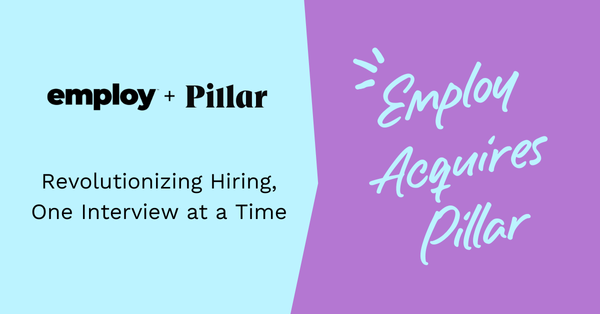Blog
Stay current with the latest talent acquisition trends, recruiting best practices, and more to help inform your people-first hiring strategy.

Recent Blog Posts
-

Trusted, People-First AI: Introducing the First of Many AI Companions in Employ’s Spring ‘25 Release
Keep Reading: Trusted, People-First AI: Introducing the First of Many AI Companions in Employ’s Spring ‘25 ReleaseAt Employ, we firmly believe in a “people-first” approach to AI, ensuring that technology empowers and enhances the human element that we know is so critical to successful hiring. Today…
-

Turn Trust into Your TA Advantage
Keep Reading: Turn Trust into Your TA AdvantageTrust. It’s one of the biggest themes that jumped out from this year’s Job Seeker Nation Report—our annual survey where we get inside the heads of 1,500+ job seekers across…
-

Inside Modern Recruiting: A Q&A with Employ’s TA Team
Keep Reading: Inside Modern Recruiting: A Q&A with Employ’s TA TeamRecruiters often don’t get the credit they deserve. Their impact is typically measured in hires, but their influence extends far beyond open reqs. Behind every great hire is a recruiter…
-

Reflecting on My First Year as CEO of Employ
Keep Reading: Reflecting on My First Year as CEO of EmployOne year ago today, I stepped into the role of CEO at Employ. Since then, I’ve had the privilege of working alongside an incredibly talented team, engaging with our customers…
-

Employ + Pillar: Supercharged AI To Strengthen Human Connection
Keep Reading: Employ + Pillar: Supercharged AI To Strengthen Human ConnectionPillar brings a suite of powerful AI-powered capabilities directly the Employ platform so your hiring teams can be more present, more focused, and more effective in selecting the right talent for your organization.
-

Why the Right Talent Acquisition Software Matters—and How Employ Stacks Up
Keep Reading: Why the Right Talent Acquisition Software Matters—and How Employ Stacks UpDiscover key insights from The Hackett Group® Digital World Class® Matrix and see how Employ’s JazzHR, Lever, and Jobvite solutions drive better hiring outcomes.
-

Beyond “More” – Doing Recruiting Better
Keep Reading: Beyond “More” – Doing Recruiting BetterRecruiting in today’s market demands a shift from “more” to “better.” Employ’s Winter ’25 Release empowers recruiters with simpler processes and a flexible talent ecosystem helping them to focus on building meaningful relationships with top talent to achieve better hiring outcomes.
-

Celebrating Progress and Looking Ahead to 2025
Keep Reading: Celebrating Progress and Looking Ahead to 2025As I reflect on my first nine months as CEO of Employ, I’m inspired by the incredible progress we’ve made together.


